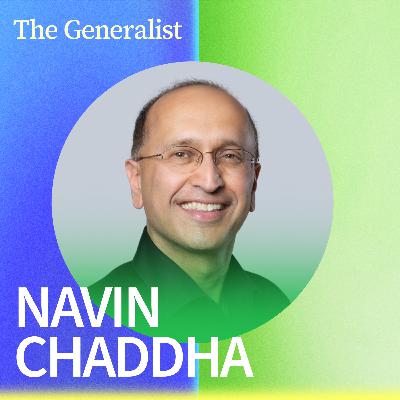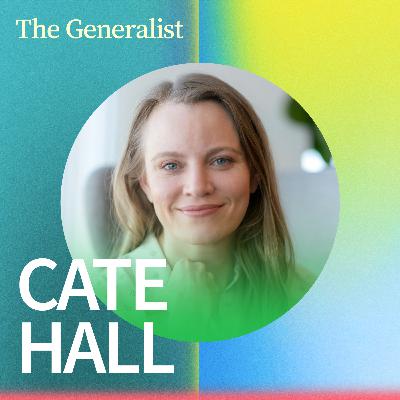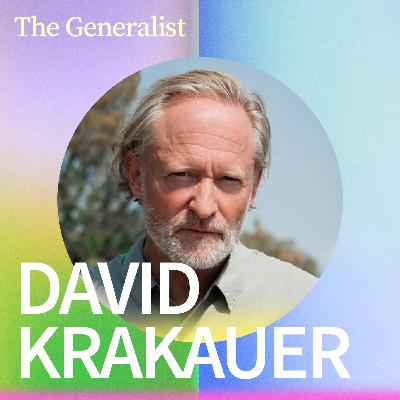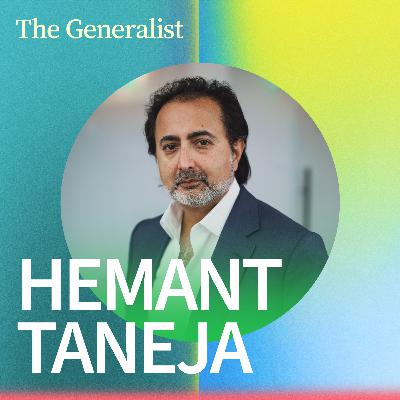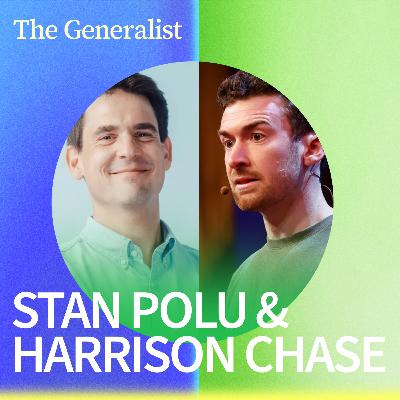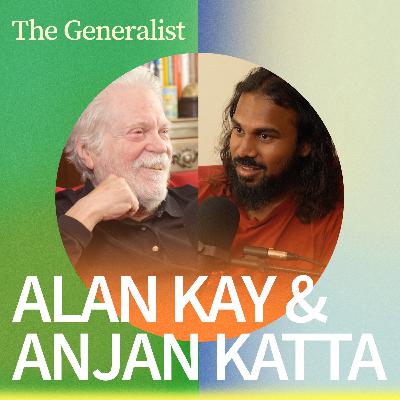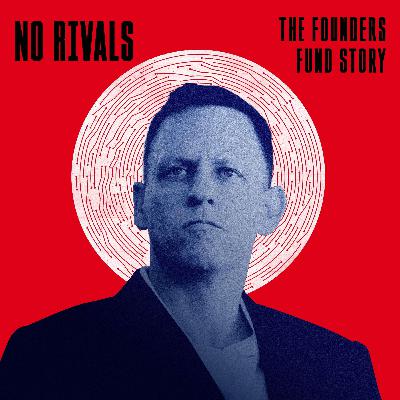Discover The Generalist
The Generalist

The Generalist
Author: Mario Gabriele
Subscribed: 30Played: 224Subscribe
Share
© Mario Gabriele
Description
“The future is already here. It’s just not evenly distributed.”
The Generalist Podcast brings you weekly conversations with the people who live in these pockets of the future – visionary founders, prescient investors, and original thinkers. Each episode is designed to introduce you to new ideas, technologies, and markets and help you prepare for the world of tomorrow.
The Generalist Podcast brings you weekly conversations with the people who live in these pockets of the future – visionary founders, prescient investors, and original thinkers. Each episode is designed to introduce you to new ideas, technologies, and markets and help you prepare for the world of tomorrow.
29 Episodes
Reverse
Prediction markets are no longer a fringe curiosity. They are becoming one of the most revealing instruments in modern finance. Platforms like Polymarket, once a niche corner of crypto, now regularly clear billions in monthly volume as traders speculate on everything from political outcomes to sports to cultural events. Few people saw this future as early, or as clearly, as Joey Krug.A decade before prediction markets went mainstream, Joey dropped out of college to co-found Augur, the first decentralized prediction market protocol. He later became one of the most influential investors in the category by backing Polymarket at Founders Fund. In this conversation, Joey shares why the moment for prediction markets has finally arrived, what has changed, and how these markets are reshaping information flows across society.We explore:The experimental mindset that led Joey from horse-racing predictions to mining bitcoin in high schoolWhy Augur was the right idea at the wrong moment, and what it taught Joey about timing and infrastructureThe product, liquidity, and founder-market fit signals that persuaded Founders Fund to back PolymarketWhy resolution is the hardest problem in prediction markets, and how Polymarket approaches itHow crypto treasury companies are emerging as a major force and where ETFs fit inWhy mimetic behavior drives entire sectors and how savvy investors read those wavesThe rise and fall of Operation Choke Point and its impact on cryptoHow Founders Fund reframed Joey’s approach to evaluating founders, markets, and structural shifts—Thank you to the partners who make this possibleGuru: The AI source of truth for work.Auth0: Secure access for everyone. But not just anyone.—Transcript: https://www.generalist.com/p/joey-krug-on-prediction-markets—Timestamps(00:00) Intro(04:10) How Joey began making predictions with horse racing(08:00) Why Joey began coding with Applesoft BASIC(09:32) How Joey first discovered crypto(11:06) Why Joey dropped out of school to pursue crypto(12:52) The origins of Joey’s interest in medical school(16:15) How Joey spends nights and weekends splitting time between biotech and trading(17:18) The early influences behind Augur’s creation(19:40) Why prediction markets captivated early crypto thinkers(23:26) The unlock crypto created for prediction markets(29:22) How Polymarket began and why Joey decided to back it(32:11) What made Polymarket the right team(35:25) The FBI raid and how Shane responded(38:20) Why Joey expected Polymarket’s volume to hold after the election(40:20) The trend toward duopolies in financial markets(42:37) What sets Polymarket’s product design apart(45:25) How to keep prediction markets clear and unambiguous(48:31) The rise of crypto treasury companies and FF’s work with BitMine(51:26) The value of crypto treasuries and the role of ETFs(54:33) The mimetic rise of crypto treasury companies(57:03) Joey’s take on where the crypto market stands now(1:00:23) Why Founders Fund is bullish on ETH(1:03:03) Operation Choke Point, regulatory whiplash, and the end of the crypto crackdown(1:06:04) Where the Clarity Act falls short(1:08:56) How Joey’s thinking has evolved since joining Founders Fund(1:13:21) Final meditations—Follow Joey KrugLinkedIn: https://www.linkedin.com/in/joeykrug—Resources and episode mentions: https://www.generalist.com/p/joey-krug-on-prediction-markets—Production and marketing by penname.co. For inquiries about sponsoring the podcast, email jordan@penname.co.
In the summer of 2022, Parth Garg woke up in Bangalore to discover that his co-founder had fled the country and emailed their investors to tell them their company was dead. Just over three years later, Aspora is one of fintech’s fastest-growing startups. The company, which makes it faster and cheaper for India’s diaspora to send money home and access banking services, now processes close to half a billion dollars in volume every month and has earned a $500 million valuation with backing from elite investors like Hummingbird Ventures, Sequoia, and Greylock.In this conversation, Parth shares his journey from physics prodigy to fintech founder, offering insights into what it really takes to build resilience as a founder and how to create a culture where feedback flows freely, even without a co-founder to provide checks and balances.—We explore:• The moment when Parth discovered his co-founder had left the country and told investors the company was shutting down• How Parth’s childhood moving between cities in India and later to the UAE shaped his adaptability and entrepreneurial mindset• His journey from physics prodigy to startup founder, including early ventures before Aspora• The process of discovering product-market fit through structured experimentation after the initial business model failed• Why the Indian diaspora represents a massive, underserved financial opportunity (1% of the population contributing 30% of deposits)• How stablecoins dramatically reduced Aspora’s working capital requirements and transformed their business model• The regulatory landscape for fintech and crypto in India and the impact of the GENIUS Act in the US• Aspora’s vision to become a comprehensive cross-border bank serving multiple diaspora communities globally—Thank you to the partners who make this possibleGoFundMe Giving Funds: One Account. Zero Hassle.Guru: The AI source of truth for work.Persona: Trusted identity verification for any use case.—Timestamps(00:00) Intro(03:53) How Parth felt when his co-founder fled the country(07:04) Parth’s early days in India and the UAE(09:37) Parth’s love of physics and competitiveness(12:15) The not-so-straightforward path from studying physics at Stanford to entrepreneurship(14:13) Parth’s physics heroes(16:24) The gap year that sparked Parth’s entrepreneurship journey(18:36) Parth’s first startup: selling near-expired groceries(21:58) Moving back to the United States and founding Vance(28:00) Joining YC and finding early backers(31:14) How Parth realized Vance needed to pivot(35:22) How Parth moved forward after his co-founder fled(37:37) Building psychological safety and open debate at Aspora(40:15) How conversations with immigrants inspired Aspora’s idea(45:13) How stablecoins solved Aspora’s biggest operational challenges(46:57) Aspora’s current scale and why India was the perfect starting point(51:34) How Aspora builds loyalty in a low-switching-cost market(52:42) The GENIUS Act and the real opportunity in stablecoins(55:52) The evolution of crypto and stablecoins in India(56:50) The importance of partnerships for scaling Aspora in India(58:18) The next phases of Aspora’s growth(01:00:04) The role of Aspora’s new bets team(1:01:20) Final meditations—Follow Parth GargLinkedIn: https://www.linkedin.com/in/parth29—Resources and episode mentions: https://www.generalist.com/p/banking-the-diaspora-parth-garg—Production and marketing by penname.co. For inquiries about sponsoring the podcast, email jordan@penname.co.
What if you could redesign the rules of society? Not tweak the margins, but start over entirely. That’s the question driving Erick Brimen, founder and CEO of Próspera, a private charter city in Roatán, Honduras. Próspera is a radical experiment in governance: a platform that lets governments and entrepreneurs build cities with new legal systems, regulatory frameworks, and institutions from the ground up. Brimen believes that governance itself can be innovated upon. That cities, like software, can be upgraded. His goal isn’t just to build one new jurisdiction, but to create an operating system for hundreds of prosperous, self-governing communities around the world. In this conversation, Erick and I explore what it really takes to build a modern Singapore from scratch — and why better governance might be humanity’s most powerful lever for progress.Together we explore:• How Brimen’s childhood in Venezuela shaped his understanding of governance and poverty• The historical precedents for charter cities like Dubai, Singapore, and Hong Kong• Why common law, trusted dispute resolution, and dynamic governance are essential foundations• How Próspera’s Governance-as-a-Service model aligns incentives between governments, operators, and residents• The current state of Próspera in Honduras, including its three hubs and economic impact• The political challenges Próspera has faced and how international arbitration has protected the project• Why regulatory innovation enables industries like biotech, crypto, and advanced manufacturing to flourish• How the model could be applied to “catch-up growth,” industry diversification, and accelerating growth in developed nations• The vision for a modern Hanseatic League of charter cities operating on shared governance principles—Thank you to the partners who make this possibleGoFundMe Giving Funds: One Account. Zero Hassle.Guru: The AI source of truth for workTezi: The AI agent for recruiting high-quality candidates quickly.—Transcript: https://www.generalist.com/p/the-170m-experiment-to-build-a-private-city—Timestamps(00:00) Intro(04:10) An overview of Próspera and charter cities(06:43) City of Próspera vs. the platform(08:06) How growing up in Venezuela shaped Erick’s entrepreneurial vision(12:36) The limits of seasteading and why Erick took a different path(15:20) The opposing philosophies that shaped Erick’s path(16:16) The moment that reshaped Erick’s understanding of poverty(19:57) The limits of learning from Dubai, Singapore, and Hong Kong(23:01) Building on the DIFC blueprint(25:12) From Arizona to Honduras: how Próspera built its first city(30:36) Why Honduras won(32:12) Inside the ZEDE framework(36:56) Próspera’s business model(43:45) Conditions on the ground in Honduras(47:14) A quick summary of how it works(48:24) Quick stats on Próspera’s scale and financing(50:47) What years of preparation made possible(52:44) The scale and purpose of Próspera’s three hubs(58:12) Próspera’s 10-year vision(1:01:12) The people Próspera was built to serve(1:04:10) Why less regulation unlocks more innovation(1:05:58) Próspera’s political headwinds(1:12:36) Why Erick remains optimistic that things will work out in Honduras(1:14:44) Addressing criticism of ZEDEs and Próspera(1:18:08) What’s next, and why the U.S. may be the greatest opportunity(1:22:30) Final meditations—Follow Erick BrimenLinkedIn: https://www.linkedin.com/in/erickbrimenWebsite: https://www.erickbrimen.com—Resources and episode mentions: https://www.generalist.com/p/the-170m-experiment-to-build-a-private-city—Production and marketing by penname.co. For inquiries about sponsoring the podcast, email jordan@penname.co.
Often called the godfather of NYC tech, Kevin Ryan is one of America’s most influential entrepreneurs and investors. He co-founded MongoDB, Business Insider, Gilt Groupe, Zola, and Transcend Therapeutics, and continues to build and back new companies each year through AlleyCorp. Earlier in his career, he led DoubleClick from a 20-person startup to a global leader, taking it public before its acquisition by Google.In this episode, Kevin shares his insights on two surprising pockets of the future that he’s betting on: psychedelics for mental health and AI-powered materials science. He unpacks how psychedelics are showing remarkable success in treating depression and PTSD, and why AI may discover revolutionary new materials, from helicopter blades to smartphone glass, that humans never imagined possible.We explore:• The promising results of psychedelics in treating depression, PTSD, and addiction• How AI is accelerating materials discovery by exploring combinations humans wouldn’t try• The challenges of building successful incubators and why most attempts fail• How MongoDB lost $1 billion before turning a profit (and why it was worth it)• Why e-commerce businesses like Gilt Groupe often struggle against physical retail• How AlleyCorp plans for the future when shaping its investment strategy• What it really costs society to imprison someone for a year• The hard truth about Europe’s tech ecosystem and why it struggles to compete with the US—Thank you to the partners who make this possibleEnterpret: Transform feedback chaos into actionable customer intelligence.Auth0: Secure access for everyone. But not just anyone.Persona: Trusted identity verification for any use case.—Transcript: https://www.generalist.com/p/why-psychedelics-might-be-the-breakthrough—Timestamps(00:00) Intro(04:30) How Kevin collaborated with Scott Adams(07:11) The origins of AlleyCorp(08:33) The challenge of incubation(10:00) Why intellectual flexibility matters(10:54) What made MongoDB a breakout success(13:49) How shifting market dynamics hurt Gilt’s business(16:22) What Kevin would do differently if he built Gilt again(17:45) Juggling AlleyCorp’s long-term vision with day-to-day demands(20:26) How to make boards more productive(22:25) Why Kevin believes investors should also found companies(24:18) Future spaces Kevin is excited to invest in(25:52) Kevin’s interest in psychedelics and founding Transcend(28:20) Psychedelics for mental health(32:03) How psychedelic therapy is being conducted(34:11) Transcend’s work and the path to approval for methylone(37:47) The challenges of psychedelic research(40:28) How the Trump administration aims to accelerate psychedelic research(41:50) The size and growth of the psychedelic market(44:28) Materials science: What it is, its design tradeoffs, and how AI speeds discovery(49:02) Radical AI’s work creating new compounds(50:34) The industries Radical AI is targeting(52:50) The state of European tech and why it still lags behind(58:26) Final meditations—Follow Kevin RyanLinkedIn: https://www.linkedin.com/in/kevinryan3/X: https://x.com/alley_corp—Resources and episode mentions—Books—• How to Change Your Mind: What the New Science of Psychedelics Teaches Us About Consciousness, Dying, Addiction, Depression, and Transcendence: https://www.amazon.com/Change-Your-Mind-Consciousness-Transcendence/dp/1594204225• Breakneck: China’s Quest to Engineer the Future: https://www.amazon.com/Breakneck-Chinas-Quest-Engineer-Future/dp/1324106034• Why We Sleep: Unlocking the Power of Sleep and Dreams: https://www.amazon.com/Why-We-Sleep-Unlocking-Dreams/dp/1501144324—Episode resources continued at: https://www.generalist.com/p/why-psychedelics-might-be-the-breakthrough—Production and marketing by penname.co. For inquiries about sponsoring the podcast, email jordan@penname.co.
Navin Chaddha has spent three decades at the forefront of innovation—first as a founder, and now as managing partner at Mayfield, one of Silicon Valley’s oldest venture firms. A 17-time member of Forbes’ Midas List, Navin has guided generations of entrepreneurs through waves of technological change, from the dot-com boom to the AI era. At Mayfield, he champions a philosophy rooted in the firm’s founding ethos: investing in people, not markets. That approach has shaped his perspective on what it takes to build enduring companies. In this conversation, Navin shares why $1 trillion in infrastructure spending is fueling a new hardware renaissance, how stealth startups are going from zero to billions in a year, and what it means for the future of innovation.We explore:How “vibe coding” is democratizing technology creation through conversational, collaborative, and cognitive interfacesWhy Navin believes the “vibe economy” will transform how we work, live, and playHow Mayfield’s 56-year focus on “backing the jockey, not the racetrack” shapes its investment approachThe massive opportunity in AI hardware infrastructureHow stealth AI hardware startups are going from zero to billions in under a yearHow India’s tech ecosystem has evolved and where the real opportunities are todayHow cricket taught Navin crucial lessons about company building—Thank you to the partners who make this possibleGoFundMe Giving Funds: One Account. Zero Hassle.Auth0: Secure access for everyone. But not just anyone.Tezi: The AI agent for recruiting high-quality candidates quickly—Transcript: https://www.generalist.com/p/the-trillion-dollar-ai-hardware-opportunity—Timestamps(00:00) Intro(04:52) Cricket and its parallels to venture capital(08:13) Navin’s journey to Silicon Valley(10:28) Growing up in an entrepreneurial family(12:00) Early mentors and becoming an “accidental entrepreneur”(13:46) Navin’s first company and unconventional fundraising approach(17:35) How Navin moved from founder to venture capitalist(20:11) What has worked in India’s tech market and what hasn’t yet taken off(23:31) The future of outsourcing in the AI era(27:14) How Navin landed at Mayfield(30:36) How Mayfield’s people-first approach works in practice(34:50) Why Navin sees AI and vibe coding as the next great wave of innovation(38:13) Why Navin believes AI will push humans to level up their skills rather than lose them(44:50) The hardware opportunities that excite Navin and where Mayfield is investing(48:49) An overview of photonics and why it matters now(50:06) How Mayfield balances market insight, big ideas, and the people behind them(52:50) The surprising pace of growth in AI hardware(54:54) The timeline from idea to product and scale in hardware startups(56:26) Final meditations—Follow Navin ChaddhaLinkedIn: https://www.linkedin.com/in/navinchaddha/X: https://x.com/navinchaddha—Resources and episode mentions: https://www.generalist.com/p/the-trillion-dollar-ai-hardware-opportunity—Production and marketing by penname.co. For inquiries about sponsoring the podcast, email jordan@penname.co.
From a child prodigy in a genetics lab to building a company that can pause life itself, Laura Deming has made a career out of chasing time. At just eight years old she became obsessed with aging. At eleven, she joined Cynthia Kenyon’s pioneering longevity lab. At seventeen, she launched The Longevity Fund—one of the first venture firms dedicated to extending human healthspan. Now, she’s tackling her boldest challenge yet: building a “pause button” for biology.As the co-founder of Until, Laura is developing reversible cryopreservation: the ability to cool living tissue to ultra-low temperatures, hold it there, and then bring it back fully functional. By achieving vitrification (the process of turning tissue into glass instead of ice), Until aims to make organ preservation, and eventually medical hibernation, a reality.We cover:• Why longevity was once stigmatized, and what changed to make it one of the most credible fields in biotech today• Why Until’s approach focuses on preserving the living, not the dead• The physics and biological challenges of scaling reversible cryopreservation from embryos to human-sized organs• How vitrification is making cryopreservation possible• How this breakthrough could transform organ transplantation by eliminating time constraints (and eventually enable medical hibernation)• The philosophical and social implications of being able to “pause” life and effectively time travel into the future• How growing up homeschooled in New Zealand shaped Laura’s unconventional way of thinking• The story of how legendary biologist Cynthia Kenyon invited 11-year-old Laura into her lab, sparking her lifelong obsession with aging• How she learned to embrace her weirdness and trust it as her creative superpower—Thank you to the partners who make this possibleGoFundMe Giving Funds: One Account. Zero Hassle.Brex: The banking solution for startups.Persona: Trusted identity verification for any use case.—Transcript: https://www.generalist.com/p/biological-time-travel-laura-deming—Timestamps(00:00) Intro(04:55) How Laura became interested in longevity at such a young age(07:40) The impact of homeschooling on Laura’s thinking(09:29) The invitation from Cynthia Kenyon that set Laura on her path at age 11(10:39) Why pursuing longevity once meant working in the shadows(14:20) Why Laura shifted into VC at The Longevity Fund(17:24) How longevity transformed from fringe science to a legitimate field(19:40) Why Laura was driven to start Until(21:08) A simple explanation of reversible cryopreservation(23:10) Science fiction’s explorations of cryo(25:38) What sparked Laura’s interest in reversible cryo(27:35) How cryonics and reversible cryo differ, and the mechanisms behind each(29:00) Until’s roadmap, beginning with cryopreserved organs for transplantation(34:00) The biggest challenges in developing preservable organs(35:53) How cryopreservation works(38:30) Until’s building philosophy(42:34) How Laura learned to trust her weirdness(49:10) Finding the right co-founder in Hunter Davis(51:17) Future applications beyond medical necessity(53:00) Unanswered questions in cryopreservation(55:05) What’s missing in Hollywood’s portrayal of genius(56:21) Laura’s unique process for exploring ideas(59:58) Personal longevity practices(01:01:30) The positive impact of Bryan Johnson’s work(01:02:38) Final meditations—Follow Laura DemingLinkedIn: https://www.linkedin.com/in/laura-deming-b255362a/X: https://x.com/laurademingWebsite: https://www.ldeming.com/—Resources and episode mentions: https://www.generalist.com/p/biological-time-travel-laura-deming—Production and marketing by penname.co. For inquiries about sponsoring the podcast, email jordan@penname.co.
Martin Casado has lived through multiple tech waves—first as a founder, now as a16z’s leading voice on AI and infrastructure. He helped pioneer software-defined networking, then moved from academia to entrepreneurship, and today backs founders building at the frontier of technology as a General Partner at Andreessen Horowitz. In this conversation, Martin shares his unique perspective on the AI boom, his market-first investment philosophy, and why he believes we’re still in the early days of AI’s impact.We explore:• Martin’s path from game engines and simulations to investing at Andreessen Horowitz• Why Martin believes we’re only in “1996” of the AI boom cycle with years to run before any bubble• Why Martin approaches investing “from markets in” rather than “from companies out”• Why the AI coding market represents a potential $3 trillion opportunity• The transformation of Andreessen Horowitz from a small generalist partnership to a specialized 600-person organization• The concerning dominance of Chinese companies in open source AI models• Why Martin thinks AGI discussions encourage “lazy thinking” and obscure meaningful conversations• How World Labs is solving the 3D representation problem that could unlock robotics, VR, and more—Thank you to the partners who make this possibleAuth0: Secure access for everyone. But not just anyone.Brex: The banking solution for startups.Persona: Trusted identity verification for any use case.—Transcript: https://www.generalist.com/p/this-feels-like-1996-martin-casado—Timestamps(00:00) Intro(04:50) Martin’s early career(08:35) Martin’s shift from academia to founding his own company during an economic downturn(11:25) The story behind Martin joining Andreessen Horowitz(17:55) Ben Horowitz’s most impactful advice(19:49) How Andreessen Horowitz has transformed since 2016(22:20) Why product experience matters more than technical prowess for infrastructure investing(26:26) Martin’s market-first investment philosophy(28:39) Andreessen Horowitz’s framework for assessing founders and startups(33:14) Why Martin thinks Hock Tan may be the best CEO today(35:18) The controversy around non-consensus investing in early stages(38:42) Why today’s AI boom reminds Martin of the mid-’90s tech environment(44:38) How today’s AI boom differs from 2021’s tech bubble(47:10) Why the promise of AI in organizations remains largely unrealized(50:29) How Martin uses AI for coding and as a reading thought partner(52:56) Why Martin doesn’t use AI for writing(53:24) Martin’s interest in Eisenhower and historical parallels to today(55:33) Two equally important paths for AI’s future(58:33) Why Cursor stood out as the leader in AI coding tools(01:01:14) The lack of inherent defensibility in AI and how to build moats(01:03:30) World Labs’ mission to transform 2D images into 3D environments(01:06:42) 3D’s emerging use cases and why the VR market may expand(01:11:50) Why Martin isn’t an “AGI guy” and how the term erodes conversation quality(01:14:59) How seeing AI as a continuum creates room for future products and investment(01:16:28) The security and regulatory challenges of Chinese open-source AI models(01:19:23) Final meditations—Follow Martin CasadoLinkedIn: https://www.linkedin.com/in/martincasado/X: https://x.com/martin_casado—Resources and episode mentions—Books—• The Weirdest People in the World: https://www.amazon.com/WEIRDest-People-World-Psychologically-Particularly/dp/1250800072/• The Beginning of Infinity: Explanations That Transform the World: https://www.amazon.com/Beginning-Infinity-Explanations-Transform-World/dp/0143121359...References continued at: https://www.generalist.com/p/this-feels-like-1996-martin-casado—Production and marketing by penname.co. For inquiries about sponsoring the podcast, email jordan@penname.co.
Cate Hall is the CEO of Astera, a private foundation focused on AI risk and frontier technology. Before leading Astera, Cate’s unconventional career path took her from practicing law (including work on Supreme Court briefs) to becoming the world’s top-ranked female poker player in 2016. After overcoming personal struggles with addiction, she co-founded Alvea, a biotech company developing shelf-stable vaccines for pandemic response, before joining Astera. In this conversation, Cate shares insights on human psychology, agency as a learnable skill, and why she believes AI’s biggest risk may be a “soft takeover” in which humans gradually lose independence and meaning.We explore:• How Cate’s approach to poker focused on reading people rather than pure game theory, and why this contrarian strategy worked• Why people who always try to “play” high status in conversations often have psychological issues• The critical difference between ambition and agency, and why they’re often confused• How LSD helped Cate break out of her career path and discover her own agency• Why Cate believes we need a slowdown in AI development to develop the social technologies to manage it• The challenge of maintaining meaning in human life as AI systems increasingly mediate our experiences• How Astera is using investment as a philanthropic tool to help steer frontier technology development—Thank you to the partners who make this possibleAuth0: Secure access for everyone. But not just anyone.Brex: The banking solution for startups.—Transcript: https://www.generalist.com/p/how-to-be-agentic-in-the-age-of-ai-cate-hall—Timestamps(00:00) Introduction to Cate Hall(03:56) Cate’s role as CEO of Astera(04:52) Cate’s poker career and focus on live reading(07:02) The intuitive ‘people radar’ Cate has in identifying exceptional talent(11:16) Status dynamics in conversations(16:13) The parallel between poker and startup evolution(19:18) The German wave in poker and game theory(24:22) Cate’s legal career and Supreme Court experience(27:05) The difference between ambition and agency(29:13) How LSD helped Cate discover her agency(31:26) Leaving poker and dealing with mental health issues(34:26) The founding story of Alvea(38:14) The founding story of Astera(43:15) Cate’s journey into AI risk(45:50) The concept of a “soft takeover” and how AI might hollow out human experience(49:46) The overwhelming challenge of addressing AI risk(51:20) Astera’s approach to steering technology development(53:15) Astera’s investment in Last Energy(54:20) How philanthropy and investing work together at Astera(57:22) Practical ways to increase personal agency(1:07:20) Final meditations—Follow Cate HallX: https://x.com/catehallLinkedIn: https://www.linkedin.com/in/cate-hall-9a81a35/Newsletter: https://usefulfictions.substack.com/—Resources and episode mentions—Books—• Zero to One: Notes on Startups, or How to Build the Future: https://www.amazon.com/Zero-One-Notes-Startups-Future/dp/0804139296/• Impro: https://www.amazon.com/Impro-Improvisation-Theatre-Keith-Johnstone/dp/0878301178• Superintelligence: Paths, Dangers, Strategies: https://www.amazon.com/Superintelligence-Dangers-Strategies-Nick-Bostrom/dp/0198739834/• The Righteous Mind: Why Good People Are Divided by Politics and Religion: https://www.amazon.com/Righteous-Mind-Divided-Politics-Religion/dp/0307455777/—People—• Jed McCaleb on LinkedIn: https://www.linkedin.com/in/jed-mccaleb-4052a4/• Charlie Carrel on X: https://x.com/charlie_carrel• Seemay Chou on X: https://x.com/seemaychou• Ben Kuhn on X: https://x.com/benkuhnEpisode resources continued at: https://www.generalist.com/p/how-to-be-agentic-in-the-age-of-ai-cate-hall—Production and marketing by penname.co. For inquiries about sponsoring the podcast, email jordan@penname.co.
David Krakauer is a leading complex systems researcher and the president of the Santa Fe Institute, a unique institution dedicated to studying complex systems across disciplines. In this episode, David challenges conventional wisdom about AI, arguing that large language models pose a more immediate threat to humanity than commonly discussed existential risks—not by destroying us directly, but by eroding our cognitive capabilities through addictive, low-quality information.We explore:• Why David believes LLMs aren't intelligent at all and how the AI community misunderstands emergence• The three dimensions of intelligence: inference, representation, and strategy—and which one LLMs lack• How AI acts as a "competitive" rather than "complementary" cognitive technology, atrophying our thinking abilities• What makes great minds unique, from analogical reasoning to the cultivation of unconscious creativity• How Cormac McCarthy's approach to knowledge and creativity offers lessons for the AI age• Why David believes the greatest threat from AI isn't existential risk but cognitive atrophy• How to protect your mind against AI's addictive pull and maintain cognitive autonomy—Thank you to the partners who make this possibleBrex: The banking solution for startups.Enterpret: Transform feedback chaos into actionable customer intelligencePersona: Trusted identity verification for any use case—Transcript: https://www.generalist.com/p/maintaining-human-intelligence-in-the-ai-era-david-krakauer—Timestamps(00:00) Intro(04:39) The Santa Fe Institute’s approach to complex systems(06:45) Murray Gell-Mann’s ‘Odysseus vs. Apollonian’(10:35) How SFI was shaped by the legacy of Los Alamos(12:45) Traits David looks for in great minds(14:43) Cormac McCarthy on naivety and how thoughtful people treat knowledge(19:24) A simple explanation of complexity science(22:50) Why vantage point doesn’t matter when studying systems(24:36) Aesthetic preferences among complexity scientists(26:07) Films and directors with complexity science themes(29:57) Why David argues LLMs are not intelligent(32:10) What’s missing in the study of LLMs(36:40) The three qualities of intelligence and how LLMs measure up(42:19) Lessons from "The Glass Bead Game"(44:00) David’s perspective on reinforcement learning(45:38) The greatest threat of LLMs: overreliance and the decline of thinking(47:40) Competitive vs. complementary cognitive artifacts(51:55) Why exposing yourself to quality ideas matters(54:00) How to derisk LLM use(58:32) Cormac McCarthy’s legacy at SFI and beyond(1:02:40) The Kekulé Problem: cultivating the unconscious(1:05:01) Why David and McCarthy were inspired by Wittgenstein(1:09:00) What Cormac McCarthy liked to talk about(1:12:20) David’s questions to a higher being(1:14:46) Final meditations—Follow David KrakauerWebsite: https://davidckrakauer.com/—Resources and episode mentions—Books—• “The Hedgehog and the Fox”: https://www.amazon.com/Hedgehog-Fox-Tolstoys-History-Second/dp/069115600X• The Birds and The Frogs: https://www.amazon.com/Aristophanes-Frogs-Birds/dp/B000QBPUTY• The Glass Bead Game: https://www.amazon.com/Glass-Bead-Game-Magister-Novel/dp/0312278497• Frankenstein: https://www.amazon.com/Frankenstein-Mary-Shelley/dp/0486282112• Blood Meridian: Or the Evening Redness in the West: https://www.amazon.com/Blood-Meridian-Evening-Redness-West/dp/0679728759• Stella Maris: https://www.amazon.com/Stella-Maris-Cormac-McCarthy/dp/0307269000• The Passenger: https://www.amazon.com/Passenger-Cormac-McCarthy/dp/0307268993/• Pale Fire: https://www.amazon.com/Pale-Fire-Vladimir-Nabokov/dp/0679723420...Episode resources continued at: https://www.generalist.com/p/maintaining-human-intelligence-in-the-ai-era-david-krakauer—Production and marketing by penname.co. For inquiries about sponsoring the podcast, email jordan@penname.co.
Salar al Khafaji is the CEO and founder of Monumental, a company building autonomous robots that assemble buildings, starting with its bricklaying system. After selling his previous software company to Palantir, Salar took time to explore big industries ripe for disruption before landing on construction—a sector that represents a significant portion of GDP yet has seen decades of productivity stagnation.We explore:• Why construction represents a massive opportunity for technological innovation• How Monumental's system of three robots works together to lay bricks autonomously• Why Europe's severe bricklayer shortage has created wages as high as €80/hour• The post-WWII shift away from beautiful architecture and how to bring it back• Why operating as a subcontractor rather than selling robots makes business sense• The challenges of building a hardware startup in Europe's tech ecosystem• How Palantir's "cult-like" culture influenced Monumental's approach to company building• The balance between structure and productive chaos in scaling a startup• Why the best robotics companies solve specific problems rather than building general-purpose machines• How to foster ambition in Europe's startup ecosystem—Thank you to the partners who make this possibleEnterpret: Transform feedback chaos into actionable customer intelligence.Brex: The banking solution for startups.Persona: Trusted identity verification for any use case.—Transcript: https://www.generalist.com/p/building-beautiful-homes-with-robots-salar-al-khafaji—Timestamps(00:00) Introduction to Salar(04:44) Overview of Monumental’s work and mission(06:25) Salar’s journey after selling his company to Palantir(11:46) Stagnation in the construction industry(14:21) The mental shift from software to hardware entrepreneurship(16:10) Salar’s funding framework(18:21) The post-WWII decline in constructing beautiful buildings(20:23) Choosing bricklaying as the first construction trade to tackle(25:20) Why Monumental operates as a subcontractor(28:38) The limitations of 3D printing and prefab construction(33:15) The technology and pricing bets Salar made(33:45) Lessons from Palantir's culture(39:35) Monumental's company culture(42:31) An overview of a construction job from start to finish(45:50) Precision and tolerances(47:50) Surprising challenges in the construction industry(49:10) The current state of Monumental and what’s next(54:00) Why humanoid robots don’t make sense for Monumental(56:16) Building an ambitious company in Europe(01:00:56) Monumental’s approach to hiring(01:03:10) The state of European tech and what needs to change(01:06:00) Salar’s optimistic take on the current state of tech in Europe(01:10:46) Final meditations—Follow Salar al KhafajiLinkedIn: https://www.linkedin.com/in/salark/X: https://x.com/salarWebsite: https://sal.ar/—Resources and episode mentions—Books—• Impro: Improvisation and the Theatre: https://www.amazon.com/Impro-Improvisation-Theatre-Keith-Johnstone/dp/0878301178• Liftoff: Elon Musk and the Desperate Early Days That Launched SpaceX: https://www.amazon.com/Liftoff-Desperate-Early-Launched-SpaceX/dp/0062979973• Seeing Like a State: How Certain Schemes to Improve the Human Condition Have Failed: https://www.amazon.com/Seeing-like-State-Certain-Condition/dp/0300078153• The Little Big Number: How GDP Came to Rule the World and What to Do about It: https://www.amazon.com/Little-Big-Number-World-about/dp/0691166528—Episode resources continued at: https://www.generalist.com/p/building-beautiful-homes-with-robots-salar-al-khafaji—Production and marketing by penname.co. For inquiries about sponsoring the podcast, email jordan@penname.co.
Sara Walker is a theoretical physicist who studies the origins of life and the author of Life as No One Knows It. As AI prompts us to rethink what consciousness, intelligence, and life really mean, Sara’s work offers a provocative framework for understanding these questions. In this conversation, Sara shares how she developed assembly theory—a revolutionary approach suggesting that complex objects like DNA molecules (and even microphones) are evidence of life’s processes.We explore:• Why Sara believes we need entirely new laws of physics to understand life• How assembly theory quantifies the transition from non-life to life with a measurable threshold• Why complex objects like DNA and microphones are evidence of evolutionary processes• How our perception of objects as “physical” or “abstract” depends on their temporal scale• Why traditional definitions of life fail as scientific frameworks• How assembly theory could revolutionize our search for extraterrestrial life• The surprising connection between urban atmospheres and biosignatures• Why Sara sees fundamental differences between computation and physical construction• How assembly theory views AI systems and large language models• The creative parallels between theoretical physics and conceptual art—Thank you to the partners who make this possibleTezi: The AI agent for recruiting high-quality candidates quicklyBrex: The banking solution for startups—Transcript: https://www.generalist.com/p/what-makes-something-alive-sara-walker—Timestamps(00:00) Intro(03:32) Sara’s background and approach to studying the origins of life(08:21) Sara’s journey to theoretical physics(11:40) How the “origin of life” field has evolved since she began her research(17:35) Introduction to assembly theory and its core principles(23:11) How assembly theory differs from traditional definitions of life(25:53) The historical parallels between assembly theory and Newtonian physics(31:45) Life vs. alive(34:33) How dabbling across disciplines led to Sara’s focus and partnership with Lee Cronin(40:43) The connection between theoretical physics and art(42:32) The probabilistic nature of assembly theory’s threshold(45:05) The time–size continuum(48:06) New threads that have emerged after Life as No One Knows It(50:27) Why assembly theory may be our best tool for finding life beyond Earth(54:04) The second feature of assembly theory: the copy number(55:39) The challenges of detecting life on exoplanets versus in our solar system(01:00:50) How recent AI developments have impacted Sara’s thinking about life(1:05:48) Whether large language models qualify as “life”(1:13:05) Final meditations—Follow Sara WalkerX: https://x.com/sara_imariLinkedIn: https://www.linkedin.com/in/saraimariwalker—Resources and episode mentions: https://www.generalist.com/p/what-makes-something-alive-sara-walker—Production and marketing by penname.co. For inquiries about sponsoring the podcast, email jordan@penname.co.
Eli Dourado is Head of Strategic Investments at Astera Institute, a foundation funding transformative science and technology across energy, aerospace, AI, and other frontier sectors. Before joining Astera, he worked as a "regulatory hacker" at Boom Supersonic, where he helped navigate complex aviation regulations to make supersonic flight viable again.In our conversation, we explore:• How Eli's refusal to be pigeonholed led to a career reviving forgotten technologies• How lifting the 1973 ban on supersonic flight could reshape aviation, after decades of stagnation and regression• Why airships need to be massive to be economical, and how they could transform global logistics• The untapped potential of geothermal energy and why drilling economics are the key bottleneck• Why titanium could be the next material to undergo a manufacturing revolution• How reading regulatory fine print can unlock trillion-dollar industries• Why AI might not automatically solve our productivity problems• The relationship between technological stagnation and potential civilizational collapse• The fascinating possibility of harvesting antimatter in space—Thank you to our sponsor: Brex—The banking solution for startups: https://www.brex.com/mario—Transcript: https://www.generalist.com/p/reviving-forgotten-technologies-eli-dourado—Timestamps(00:00) Intro and Eli's background(04:11) Eli’s work at Astera Institute(07:53) The frontier sectors Astera is betting on(08:57) Eli’s path from academia to tech investing(13:06) How Eli became involved with supersonic flight(15:42) Why the airline industry entered “the great regression”(18:38) The origins of the overland supersonic flight ban(20:37) Working as a "regulatory hacker" at Boom Supersonic(27:30) The current state of supersonic flight technology(30:40) Eli’s cargo airship research(37:20) What sparked Eli’s interest in airships(40:23) Why airships fell out of favor as a way to travel(42:53) How Jim Coutre found a path to profitable airships(47:00) The pros, cons, and profit potential of airship travel(50:08) A case for geothermal energy(55:37) Understanding the “idiot index” and scaling titanium production(58:36) Thoughts on AI and avoiding complacency(01:02:00) The risks fueling a potential societal collapse(01:06:10) Final meditations—Follow Eli DouradoNewsletter: https://www.elidourado.com/LinkedIn: https://www.linkedin.com/in/elidourado/X: https://x.com/elidourado—Resources and episode mentions: https://www.generalist.com/p/reviving-forgotten-technologies-eli-dourado—Production and marketing by penname.co. For inquiries about sponsoring the podcast, email jordan@penname.co.
Hemant Taneja is the CEO and Managing Partner of General Catalyst, a venture capital firm that has evolved into what he describes as a "strategic conglomerate with venture capital at its core." Under his leadership, GC has expanded beyond traditional investing to become an organization focused on transforming entire industries from healthcare to call centers to insurance.In this conversation, Hemant unpacks General Catalyst's unusual structure and ambitious mission. He shares why his firm acquired the hospital system Summa Health in Ohio, why AI roll-ups will create some of the most valuable IPOs in the coming decade, and how servant leadership principles have reshaped his approach to building organizations.We explore:• How General Catalyst evolved from a traditional VC firm into a multi-business "strategic conglomerate"• Why Hemant believes the next decade requires completely rethinking what excellence means in company building• How GC's healthcare transformation company (HATCo) is working to reinvent the American healthcare system• Why GC made the unprecedented move to acquire Summa Health, a hospital system in Ohio• How servant leadership principles learned from Ken Chenault transformed Hemant's approach to building organizations• Why AI is accelerating transformation across industries faster than anyone predicted• How General Catalyst built its global seed practice through unusual acquisitions of La Famiglia, Venture Highway, and Wayfinder• Why Hemant believes AI roll-ups of labor arbitrage businesses will become some of the most valuable IPOs in the next decade• The changing profile of successful founders in an era of rapid technological change• How General Catalyst thinks about balancing profit and purpose across its portfolio—Thank you to our sponsor: Brex—The banking solution for startups.—Transcript: https://www.generalist.com/p/inside-general-catalyst-hemant-taneja—Timestamps00:00) Intro(02:16) General Catalyst’s ambition to help shape the future(04:23) How General Catalyst challenges founders to think bigger(06:05) GC's structure as a strategic conglomerate(10:44) Balancing profit and purpose in venture investing(12:19) The unusual role of CEO in a venture firm(15:11) How Hemant approaches decision-making in operations vs. investing(16:43) Lessons from Ken Chenault and the case for servant leadership at GC(20:55) What Hemant has learned from Amazon, McKinsey, and Nvidia’s cultures(23:37) The Berkshire Hathaway model—and how GC’s strategy differs(25:19) Why Hemant felt GC needed a fundamental rethink(28:33) What has changed since Hemant wrote his book on AI in 2018(31:07) Why great founders have shifted from hackers to iterative builders(32:55) The origin of HATCo and GC’s push into healthcare transformation(39:32) Why HATCo acquired Summa Health(43:48) What HATCo is planning next(46:30) Hemant’s thoughts on policy and responsible AI self-governance(48:49) Europe’s AI lag, the cloud wave it missed, and the case for sovereign infrastructure(52:38) Why companies move to the US(54:22) How to transform traditional industries with AI(56:37) Rollout vs. buyout, and why starting small makes more sense now(58:56) How rapid model progress unlocks new opportunities to reinvent businesses(1:01:10) What companies need to be good partners in the creation portfolio incubator(1:05:13) Why General Catalyst made rare acquisitions based on deep conviction in people(1:11:34) Final meditations—Follow Hemant TanejaLinkedIn: https://www.linkedin.com/in/hemanttanejaX: https://x.com/htaneja—Resources and episode mentions: https://www.generalist.com/p/inside-general-catalyst-hemant-taneja—Production and marketing by penname.co. For inquiries about sponsoring the podcast, email jordan@penname.co.
Jesse Walden is the founder and managing partner of Variant Fund, an early-stage crypto fund backing projects like Uniswap, Phantom, World, Morpho, Flashbots, Farcaster, Blockaid, Blackbird, and many more. Before launching Variant in 2020, he was an investor at a16z crypto, where he supported early-stage builders shaping the future of Web3.In this episode, Jesse offers a wide-ranging view of where crypto stands today, and where it’s headed. He unpacks the rise of stablecoins, the role of meme coins in capturing attention, and why NFTs are evolving rather than disappearing. We explore the challenges of interoperability between blockchains, the shift from invention to productization, and the intersection of crypto and AI, two technologies that may supercharge one another’s progress.In our conversation, we explore:• The fundamental difference between AI (technology of abundance) and crypto (technology of scarcity), and why the two technologies are complementary• How the GENIUS Act is transforming the regulatory landscape for stablecoins and creating unprecedented bipartisan support• How DAOs 2.0 will return to their original vision: automation at the center with humans at the edges• How meme coins generate hype and the value of attention• Why user experience still holds Web3 back and what needs to change• What still needs to be solved to scale crypto, including true cross-chain interoperability—Thank you to our sponsor: Brex—The banking solution for startups.—Transcript: https://www.generalist.com/p/the-future-of-crypto-jesse-walden—Timestamps(00:00) Intro(02:19) An overview of Variant’s work(03:03) Jesse’s vision of a tokenized future and why it makes sense(06:19) The state of crypto since 2022(10:46) The GENIUS Act: what it is and how it could reshape stablecoins(14:28) How stablecoins are both a payment tool and a communication layer(17:07) Why stablecoins are not yet convenient in the US(19:06) Variant’s investment in stablecoins and blockchains(21:33) The policy and regulation crypto still needs to mature(24:15) Speculation vs. stablecoins(27:06) Meme coins and the attention economy(31:53) The shift from invention to productization(33:47) How the user experience is evolving in crypto, and what’s still needed(38:15) Phantom and other companies Jesse is bullish on(42:20) The short-term dip and long-term rise in developer talent(47:48) Jesse’s heuristic for determining a founder’s passion in the crypto space(50:37) Where AI and crypto collide (and what they can do for each other)(56:48) Why there’s still opportunity for NFTs(01:01:57) An explanation of DAOs and DAO 2.0’s opportunity for humans(01:07:04) Final meditations—Follow Jesse WaldenX: https://x.com/jessewldnLinkedIn: https://www.linkedin.com/in/jessewalden/Website: https://jessewalden.com/—Resources and episode mentions—Books—• Narrative Economics: How Stories Go Viral and Drive Major Economic Events: https://www.amazon.com/Narrative-Economics-Stories-Economic-Events/dp/0691182299• The White Paper: https://www.amazon.com/The-White-Paper/dp/1999675924—People—• Sam Altman on X: https://x.com/sama• Vitalik Buterin on X: https://x.com/vitalikbuterin—Other resources—• Bitcoin: https://bitcoin.org• Stablecoin: https://en.wikipedia.org/wiki/Stablecoin• Beyond Speculation and Stablecoins: Crypto's Next Phase?: https://jessewalden.com/beyond-speculation-and-stablecoins-cryptos-next-phase/• What is DeFi?: https://www.coinbase.com/learn/crypto-basics/plp-what-is-defi• Morpho: https://morpho.org/• Pump.fun: https://pump.fun/• Zora: https://zora.co/• Docker: https://www.docker.com/• Privy: https://www.privy.io/• Stripe: https://stripe.com/• Kraken: https://www.kraken.com/• Phantom: https://phantom.com/...References continued at: https://www.generalist.com/p/the-future-of-crypto-jesse-walden—Production and marketing by penname.co. For inquiries about sponsoring the podcast, email jordan@penname.co.
What’s next for AI agents, and how will they change the way we work? In this conversation, Stanislas Polu (CEO of Dust, formerly research at OpenAI) and Harrison Chase (CEO of LangChain, one of the most influential open-source AI frameworks) unpack the current state and future of AI agents. They reflect on their early conversations in the pre-ChatGPT days, how the landscape has evolved, and where it's headed next.Stan and Harrison share lessons from building today’s agent infrastructure—from chat interfaces to the future of ambient, autonomous systems—and discuss the challenges of operating in the chaotic "fog of AI." We dig into the open questions, early insights, and messy realities of building in today’s fast-moving AI landscape.In our conversation, we explore:• What sparked Stan and Harrison’s early interest in LLMs• The pre-ChatGPT era and how the AI landscape has evolved since late 2022• High-leverage use cases for agents inside Dust and LangChain today• The critical differences between AI workflows and true agents—and why agents may unlock more powerful, long-term solutions• Why reliability is the main blocker to ambient agents• Real-world enterprise use cases for AI agents across customer support, sales, and engineering• How to build in the “fog of AI” and the challenge of maintaining product vision when foundations shift every six months• Strategies for creating defensibility in a world where tech giants can quickly replicate features• The future of multi-agent systems and how they could transform enterprise productivity• The current state of the AI talent market• And much more—Thank you to our sponsor: Brex—The banking solution for startups.—Transcript: https://www.generalist.com/p/the-evolution-of-ai-agents—Timestamps(00:00) Intro(02:33) Brief overviews of Dust and LangChain(03:30) The early days of LLM product development(11:02) Harrison's journey to founding LangChain(14:35) Dust's evolution and focus on enterprise productivity(17:15) Tobi’s AI memo(18:42) An overview of AI agents and how they differ from AI workflows(26:43) High-leverage use cases for agents at Dust and LangChain(30:41) How to interact with agents and an explanation of ambient agents(36:21) What the future of agents may look like(40:52) Current limitations of AI agents and reliability challenges(45:40) Will we converge to one agent or many specialized ones?(51:32) How to solve the sycophant problem(56:04) The challenges of building AI companies in a rapidly changing landscape(01:03:06) Recent AI talent acquisitions and market dynamics(01:05:28) How Dust and LangChain attract talent(01:09:12) How far off AGI may be(01:12:52) Final meditations—Follow Stanislas PoluLinkedIn: https://www.linkedin.com/in/spolu/X: https://x.com/spolu—Follow Harrison ChaseLinkedIn: https://www.linkedin.com/in/harrison-chase-961287118/X: https://x.com/hwchase17—Resources and episode mentions: https://www.generalist.com/p/the-evolution-of-ai-agents—Production and marketing by penname.co. For inquiries about sponsoring the podcast, email jordan@penname.co.
Tomasz Tunguz has spent almost two decades turning data into investment insights. After an impressive run at Redpoint Ventures, where he backed Looker, Expensify, Monte Carlo, and more, Tomasz launched Theory Ventures in 2022. His debut fund, which closed at $238 million, was followed 19 months later by a $450 million second fund.Theory’s goal is simple but striking: to build an “investing corporation” where researchers, engineers, and operators sit alongside investors, arming the partnership with real‐time market maps, in‑house AI tooling, and domain expertise. Centered on data, AI, and crypto infrastructure, the firm operates at the very heart of many of today’s most consequential technological shifts.In our conversation, we explore:• How Theory’s “investing corporation” model works• Why crypto exchanges could create a viable path to public markets for small-cap software companies• The looming power crunch—why data centers could consume 15% of U.S. electricity within five years• Stablecoins’ rapid ascent as major banks route 5‑10% of U.S. dollars through them• Why Ethereum faces an existential challenge similar to AWS losing ground to Azure in the AI era• Why Tomasz believes today’s handful of agents will become 100+ digital co‑workers by year‑end• Why Meta is betting billions on AR glasses to change how we interact with machines• How Theory Ventures uses AI to accelerate market research, deal analysis, and investment decisions• Much more—Thank you to the partners who make this possibleBrex: The banking solution for startups.Generalist+: Essential intelligence for modern investors and technologists.—Transcript: https://www.generalist.com/p/the-decade-of-data-with-tomasz-tunguzh-h-tomasz-tunguz—Timestamps(00:00) Intro(03:37) Tomasz's background and journey to founding Theory Ventures(04:57) Theory's data-driven approach to venture(09:25) The importance of functional experts on investment teams(11:45) Theory's focus on data systems and why they matter(15:02) The decade of data(18:40) The challenges of chip-level investment(20:11) The state of crypto(23:30) How crypto could accelerate IPO timelines(28:12) Tokenized secondaries and venture capital’s evolution(32:18) Ethereum's challenges against competitors like Solana(37:25) Hyperliquid(38:38) The shift from proof of work to proof of stake to proof of authority(41:20) How Tomasz uses AI for personal productivity(45:03) How Theory Ventures uses AI internally(49:41) The future of work with AI agents(52:42) The current state of the AI race between Microsoft, Google, and Meta(58:28) Final meditations—Follow Tomasz TunguzWebsite: https://tomtunguz.com/LinkedIn: https://www.linkedin.com/in/tomasztunguz/X: https://x.com/ttunguz—Resources and episode mentions—Book—• Narcissus and Goldmund: https://www.amazon.com/Narcissus-Goldmund-Hermann-Hesse/dp/0553275860—People—• Patrick O’Grady on X: https://x.com/_patrickogrady—Other resources—• Theory Ventures: https://theory.ventures/• Insight Partners: https://www.insightpartners.com/• Palantir: https://www.palantir.com/• Databricks: https://www.databricks.com/• Snowflake: https://www.snowflake.com/• Ethereum: https://ethereum.org• Solana: https://solana.com/• Jamie Dimon blasts crypto, tells Senate he would ‘close it down’—even as JPMorgan pushes forward with blockchain payments: https://fortune.com/crypto/2023/12/06/jamie-dimon-crypto-senate-hearing-jpmorgan-blockchain-payments/• Robinhood: https://robinhood.com/• Coinbase: https://www.coinbase.com/• Uniswap: https://app.uniswap.org/• Sarbanes-Oxley Act: https://en.wikipedia.org/wiki/Sarbanes%E2%80%93Oxley_Act• ASX: https://www.asx.com.au/...Episode resources continued at: https://www.generalist.com/p/the-decade-of-data-with-tomasz-tunguzh-h-tomasz-tunguz—Production and marketing by penname.co. For inquiries about sponsoring the podcast, email jordan@penname.co.
I'm thrilled to share this very special episode of The Generalist—one I've been looking forward to for a long time. Today, we tackle one of the most urgent questions of our time: What should computing look like in the age of AI?I'm joined by two extraordinary guests: Alan Kay, a pioneer of modern computing whose vision helped shape the personal computer revolution, and Anjan Katta, founder of Daylight, who's building a radically reimagined personal computer designed for deep thinking in our AI-saturated world. This conversation has been months in the making, and I couldn't be more excited to bring these two brilliant minds together.We explore how artificial intelligence is reshaping our relationship with computers, whether current computing paradigms serve us well as AI becomes ubiquitous, and what new models of human-computer interaction we might need to thrive alongside intelligent machines.This is a conversation about reclaiming agency in an age of algorithms—and imagining computing tools that amplify human intelligence rather than replace it. I think you're going to love it.We explore:• Why Alan believes the "computer revolution" commercialized in the wrong direction, missing the deeper humanistic vision of early computing pioneers• How the structure of information, from pagination to platforms, shapes the way we think• How Daylight is creating a reading and writing-focused device that helps access our "prefrontal cortex" rather than our "lizard brain"• The concept of a magical medium, and how computing might help us become our best selves• Why Marshall McLuhan's media theories predicted our current technological predicament decades before it happened• The critical difference between intelligence and wisdom in computing systems, and why wisdom should be our focus• How thoughtful constraints in computing design can lead to better thinking and more meaningful interaction• The urgency of developing systems thinking in a world facing complex challenges• And much more—Transcript: https://thegeneralist.substack.com/p/why-the-real-computer-revolution-never-happened—Thank you to the partners who make this possibleAugment Code: AI coding assistant that pro engineering teams love.Brex: The banking solution for startups.Generalist+: Essential intelligence for modern investors and technologists.—Timestamps(00:00) Intro(05:17) The computer revolution we never got (and what we got instead)(11:45) The value of writing and the impact of the printing press(21:34) The addition of pagination and the evolution of arguments(24:53) Why Anjan calls his idealized version of computing a magical medium(29:00) Alan’s work at PARC and early conceptions of personal computing(32:02) Moore’s Law and the impact of reality TV(37:41) How Bob Barton and Marshall McLuhan influenced Alan(42:31) The problem with labels and what Anjan found surprising about Alan(46:02) How much help is too much help?(48:18) Marvin Minsky's military robot story and the history of misunderstanding AGI(51:50) What we need help with and why wisdom is hard to scale(54:19) How Daylight approaches computing with humility and thoughtful constraints(59:13) Alan's reflections on the Dynabook concept and personal computing vision(01:01:11) The timeline of building Daylight and the idealism behind the project(01:03:14) The urgent need for different thinking(01:06:40) A second shot at rebuilding computing from the ground up(01:11:57) Final meditations—Follow Alan KayLinkedIn: https://www.linkedin.com/in/alan-kay-12a627b/Quora: https://www.quora.com/profile/Alan-Kay-11—Follow Anjan KattaLinkedIn: https://www.linkedin.com/in/anjan-katta-250b232b4/X: https://x.com/anjankatta—Resources and episode mentions: https://www.generalist.com/p/why-the-real-computer-revolution-never-happened—Production and marketing by penname.co. For inquiries about sponsoring the podcast, email jordan@penname.co.
Today’s podcast is a little different. Instead of a new interview, you’ll hear Part I of “No Rivals,” The Generalist’s definitive four-part deep dive into Founders Fund — Silicon Valley’s most controversial (and consistently top-performing) venture firm.—What’s inside Part I• How Peter Thiel and team set out to rewrite VC’s playbook• The contrarian philosophy behind their earliest bets• The people, power dynamics, and inflection points that shaped the firm—Want the full story?Parts II–IV (a 3h 15m extended cut packed with performance data and insider interviews) are available to Generalist Premium members. Join here → generalist.com/subscribe—As a Premium member, you’ll also unlock:• Case studies on Kleiner Perkins, USV, Tiger Global, and more• Exclusive interviews• Private startup databases• Tactical operator guides• And moreAll designed to give you an investing and operating edge.—Skip ahead(00:00) Intro(01:30) PART I: THE PROPHET(05:42) Pals(11:16) Spite Store (18:21) Clarium Calls(21:57) Gate-Crasher(28:55) Parker(40:22) Moonshots
How close are we to the end of humanity? Toby Ord, Senior Researcher at Oxford University’s AI Governance Initiative and author of The Precipice, argues that the odds of a civilization-ending catastrophe this century are roughly one in six. In this wide-ranging conversation, we unpack the risks that could end humanity’s story and explore why protecting future generations may be our greatest moral duty.We explore:• Why existential risk matters and what we owe the 10,000-plus generations who came before us• Why Toby believes we face a one-in-six chance of civilizational collapse this century• The four key types of AI risk: alignment failures, gradual disempowerment, AI-fueled coups, and AI-enabled weapons of mass destruction• Why racing dynamics between companies and nations amplify those risks, and how an AI treaty might help• How short-term incentives in democracies blind us to century-scale dangers, along with policy ideas to fix it• The lessons COVID should have taught us (but didn’t)• The hidden ways the nuclear threat has intensified as treaties lapse and geopolitical tensions rise• Concrete steps each of us can take today to steer humanity away from the brink—Transcript: https://www.generalist.com/p/existential-risk-and-the-future-of-humanity-toby-ord—This episode is brought to you by Brex: The banking solution for startups.—Timestamps(00:00) Intro(02:20) An explanation of existential risk, and the study of it(06:20) How Toby’s interest in global poverty sparked his founding of Giving What We Can(11:18) Why Toby chose to study under Derek Parfit at Oxford(14:40) Population ethics, and how Parfit’s philosophy looked ahead to future generations(19:05) An introduction to existential risk(22:40) Why we should care about the continued existence of humans(28:53) How fatherhood sparked Toby’s gratitude to his parents and previous generations(31:57) An explanation of how LLMs and agents work(40:10) The four types of AI risks(46:58) How humans justify bad choices: lessons from the Manhattan Project(51:29) A breakdown of the “unilateralist’s curse” and a case for an AI treaty(1:02:15) Covid’s impact on our understanding of pandemic risk(1:08:51) The shortcomings of our democracies and ways to combat our short-term focus(1:14:50) Final meditations—Follow Toby OrdWebsite: https://www.tobyord.com/LinkedIn: https://www.linkedin.com/in/tobyordX: https://x.com/tobyordoxford?lang=enGiving What We Can: https://www.givingwhatwecan.org/—Resources and episode mentions—Books—• The Precipice: Existential Risk and the Future of Humanity: https://www.amazon.com/dp/0316484911• Reasons and Persons: https://www.amazon.com/Reasons-Persons-Derek-Parfit/dp/019824908X• Practical Ethics: https://www.amazon.com/Practical-Ethics-Peter-Singer/dp/052143971X—People—• Derek Parfit: https://en.wikipedia.org/wiki/Derek_Parfit• Carl Sagan: https://en.wikipedia.org/wiki/Carl_Sagan• Stuart Russell: https://en.wikipedia.org/wiki/Stuart_J._Russell—Other resources—• DeepMind: https://deepmind.google/• OpenAI: https://openai.com/• Manhattan Project: https://en.wikipedia.org/wiki/Manhattan_Project• The Unilateralist’s Curse and the Case for a Principle of Conformity: https://nickbostrom.com/papers/unilateralist.pdf• The Nuclear Non-Proliferation Treaty (NPT), 1968: https://history.state.gov/milestones/1961-1968/npt• The Blitz: https://en.wikipedia.org/wiki/The_Blitz• Operation Warp Speed: https://en.wikipedia.org/wiki/Operation_Warp_Speed—Production and marketing by penname.co. For inquiries about sponsoring the podcast, email jordan@penname.co.
Why search for life beyond Earth? For MIT astrophysicist and MacArthur Genius Fellow Sara Seager, it’s not just a scientific question—it’s a deeply human one. Like creating art or studying philosophy, the search taps into our primal curiosity about who we are and whether we’re alone. Sara is a pioneer in the field of exoplanets: planets that orbit stars other than our Sun. Her early work was met with skepticism. Today, she’s one of the most respected voices in the field, with discoveries that have redefined our understanding of the universe. From detecting alien atmospheres to reimagining where life might exist, she shares how entrepreneurial thinking and intuition are fueling groundbreaking discoveries.In our conversation, we explore:• An explanation of exoplanets and the importance of their discovery• The key technologies that enabled exoplanet detection• Sara’s controversial discovery of phosphine gas in Venus's atmosphere and why it could be a sign of life• An overview of Project Starshade, why NASA has currently shelved it, and why Sara continues to work on it anyway• How scientific innovation often requires challenging authority and conventional wisdom• How Sara approaches her research portfolio like an investment strategy, but with an inverse risk profile• Why AI may someday explore planets we’ll never reach—and what that means for humanity• Much more!—For a full transcript of the episode, please visit: https://www.generalist.com/p/are-we-alone-in-the-universe-sara-seager—Thank you to the partners who make this possibleAugment Code: AI coding assistant that pro engineering teams love.Brex: The banking solution for startups.—Timestamps(00:00) Intro(04:07) What is an exoplanet?(04:33) The diverse types of exoplanets, including the common Sub-Neptune type(06:40) Why the search for habitable planets matters(08:57) The timeline for finding life outside of Earth(10:15) Parallels between professors and entrepreneurs(11:37) Sara’s background and inspirations(15:48) Why the study of exoplanets was initially viewed with skepticism(18:38) Technology breakthroughs enabling exoplanet discovery(21:05) Looking for atmospheric signals as signs of life(25:48) The K2-18b debate and challenges of detecting life(31:10) The Venus Life Finder Initiative and phosphine discovery(37:38) The mission to explore Venus's atmosphere(39:20) Goals of the first missions and the inspiration from a prior Soviet balloon mission(41:58) An overview of the Starshade project(47:44) Applications from the Venus mission that may benefit Earth(48:50) Sara's scientific "investment portfolio" and the impact of the MacArthur grant(52:46) The power of intuition(56:09) Formative lessons from Sara’s childhood(59:04) How Sara uses AI for administrative tasks(01:00:38) The evolution of AI(01:01:50) Sara’s speculation on life beyond Earth(01:03:24) Where Sara's best ideas come from(01:04:02) Final meditations—Follow Sara SeagerLinkedIn: https://www.linkedin.com/in/sara-seager-1352b85/Website: https://www.saraseager.com/—Resources and episode mentions—Books—• The Smallest Lights in the Universe: A Memoir: https://www.amazon.com/Smallest-Lights-Universe-Memoir/dp/0525576258• The Giver: https://www.amazon.com/Giver-Quartet-Lois-Lowry/dp/0544336267—People—• John Bahcall: https://en.wikipedia.org/wiki/John_N._Bahcall—Other resources—• Exoplanets: https://science.nasa.gov/exoplanets/• Sub-Neptune: https://en.wikipedia.org/wiki/Sub-Neptune• NASA’s Asteroid Bennu Sample Reveals Mix of Life’s Ingredients: https://www.nasa.gov/news-release/nasas-asteroid-bennu-sample-reveals-mix-of-lifes-ingredients/• Seager Hair Transplant Centre: https://www.seagerhairtransplant.com/• Kepler: https://science.nasa.gov/mission/kepler/...Resources continued at: https://www.generalist.com/p/are-we-alone-in-the-universe-sara-seager—Production and marketing by penname.co. For inquiries about sponsoring the podcast, email jordan@penname.co.






